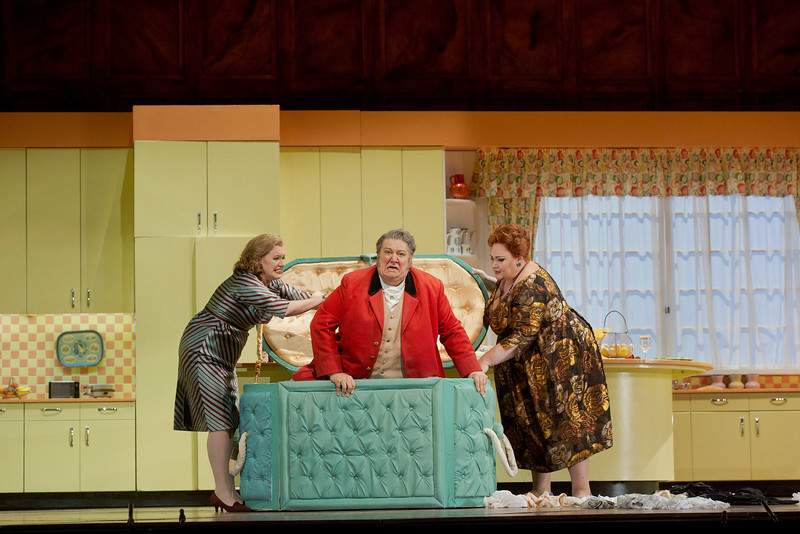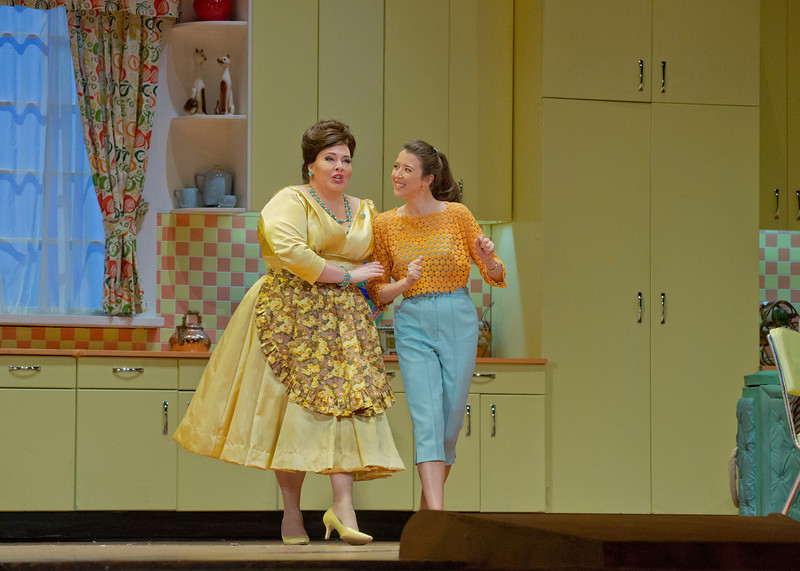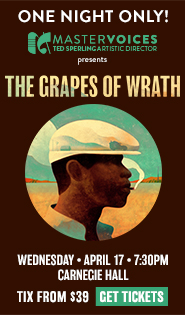A fine ensemble cast boosts the Met’s delightful Fifties-era “Falstaff”

Ambrogio Maestri in the title role and Stephanie Blythe as Mrs. Quickly in the new Metropolitan Opera production of Verdi’s “Falstaff.” Photo: Ken Howard.
It took a village—five countries, really—to give birth to the new production of Verdi’s Falstaff, which opened at the Metropolitan Opera Friday night. Shared with Covent Garden, La Scala, the Canadian Opera Company, and De Nederlandse Opera, this is the staging’s third stop on a tri-continental journey: Toronto and Amsterdam will follow, as will a tour to Japan. The Met’s much-loved 1964 Franco Zeffirelli production, which dated back to the old 39th Street house, will be missed, but Robert Carsen’s new take on Verdi’s final opera is a true delight.
Carsen sets his version in late-1950s London, well after the war but just before the Mod revolution. It was a time when existing social systems were crumbling, and Carsen has great fun contrasting the twilight of aristocracy with the rise of the middle class. The Garter Inn is now an old, stuffy hotel—looming, heavy wainscoting is a theme that runs throughout the production—and Sir John is attended by valets, butlers, and room-service waiters who clearly chafe under his obnoxious demands. Paul Steinberg’s spot-on scenic design includes the hotel’s sedately posh restaurant and men’s club, as well as the Fords’ ultra-modern suburban kitchen, replete with Formica dinette set.
Stage action is kept busy but never confusing; no matter how many cast and chorus members are on view, Carsen knows just where to direct the eye. He is a master of the Less Is More school of presentation, and here, as in many of his other productions, he keeps the stage clutter down to a minimum in order to focus on the story and the singers. All he needs to represent Windsor Forest is a brilliantly starry sky and some dry-ice fog effects, plus spookily comic looming shadows (he is also credited as the production’s lighting designer).
Brigitte Reiffenstuel’s accurate, slightly over-the-top costumes provide most of the color and visual excitement, not to mention plenty of laughs: The late 50s in England were not exactly a high point of fashion design. Pillbox hats predominate, as do bouffant hairdos and form-fitting satin dresses that hug their unfortunate wearers in all the wrong places. The ponytailed Nanetta, at home in her Capri pants in Act II, could have come right out of Bye Bye, Birdie.
Buoyed by Carsen’s direction and the masterful conducting of James Levine, the cast entered fully into the spirit of things at Friday’s opening-night performance. Ambrogio Maestri practically owns the role of Falstaff these days; he plays the character with charm and a surprising amount of subtlety. One misses the bigger, plusher sound of some of the Met’s great prior Falstaffs such as Bryn Terfel and Giuseppe Taddei, but Maestri interprets Boito’s text impressively and his diction carries every word. He also gives a physical performance which reminds us that, for all his grossness and debauchery, Sir John is still a knight and capable of moments of grace and elegance—particularly when he is trying to win a lady’s eye.
As Alice, Angela Meade lightened her commanding lirico spinto for the occasion, easily dispatching the trills Verdi wrote into her role, and seemed unafraid to use her own plus-size frame to comic effect in her Act II flirtation scene with Falstaff. Jennifer Johnson Cano’s mezzo gave balance to ensemble moments and she clearly had great fun with her role; she made one regret that Verdi did not give Meg Page enough solo passages. Stephanie Blythe was the perfect Mistress Quickly, moving like a galleon at full sail and booming out her lines with contralto gusto.
Franco Vassallo’s appealing contribution as Posa on Jonas Kaufmann’s recent Verdi disc boded well for his Ford. Unfortunately, his voice sounded rather small and undistinguished in this context. He threw himself into his role with alacrity, but Ford can be sung more beautifully and lyrically than this.
Paolo Fanale, the debuting Fenton, was a sweet and ingratiating presence. But his rather piercing timbre failed to accommodate the dreamy pianissimi required in Act III. His voice did not blend well with the wonderfully silky, bell-like soprano of Lisette Oropesa, whose Nanetta charmed without cloying. Her sustained high notes during “Sul fil d’un soffio” were as magical as one could hope for. In smaller parts, Carlo Bosi was an enjoyably apoplectic Dr. Caius, Keith Jameson an appropriately squirrely Bardolfo, and Christian Van Horn a Pistola whose mellifluous bass voice made you want to immediately hear him in a more sizable role.
Carsen made his Met premiere in 1997 with a Eugene Onegin beloved by many for its minimalist subtlety. It was disposed of too soon, in favor of this season’s disappointing new production by Deborah Warner. The Met giveth and the Met taketh away. If we’re lucky, this Falstaff will be around for much longer.
Falstaff continues through January 11. metoperafamily.org
Eric Myers is a frequent contributor to Opera News, Opera, and Time Out New York. His writing has also appeared in The New York Times, Art and Auction, and Variety, and he is the author of three books published by St. Martin’s Press.

Jennifer Johnson Cano as Meg Page, Ambrogio Maestri and Stephanie Blythe in Verdi’s “Falstaff.”
Photo: Ken Howard




Posted Dec 08, 2013 at 4:44 am by Ralph Acosta
I am mystified how you could devote soooooooooooo much space to the production and dispatch Maestro Levine’s contribution with 6 words!!! Perhaps you want to address this huge shortcoming in future reviews………..also not one mention of what kind of an evening the wonderful Met Orchestra was having. Far too much time on the production which most of us would be satisfied with 1 paragraph and not a book.
Posted Dec 12, 2013 at 9:19 am by stan
I have yet to meet an operagoer other than a critic who liked Carsen’s “Eugene Onegin” production. Putting nothing but leaves and chairs on a stage and having Onegin shave and change his clothes during the Polonaise is not my idea of “visionary”. It is only because Carsen directed this “Falstaff” that I have reservations about seeing it.
You mentioned the Zeffirelli production. He also did the Tosca before the current production. Every critic disliked that one. Well, just take a look at the crap of a Tosca (which, incidentally, I saw last night) the Met has onstage these days.